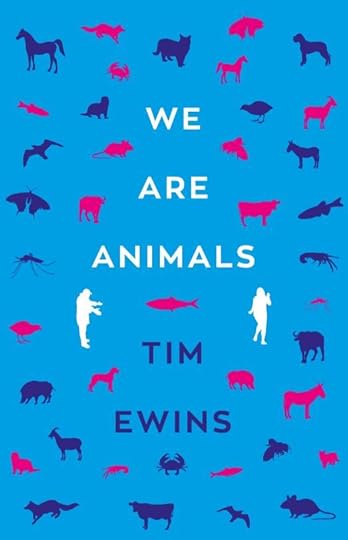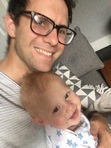Tim Ewins's Blog, page 3
March 2, 2020
Bookshine and Readbows review
Thank you to Bookshine and Readbows for this lovely review!
We Are Animals is an extraordinary story about some very ordinary people.
The story begins, and ends, on a beach (different beaches). Jan is a ‘moustache’ (older man, firmly entrenched in his opinions and resistant to change) and Sharkey is a ‘vest’ (young, full of spirit and spirits, and looking for himself at beach discos). Gradually the older man’s prickly disdain and the younger man’s gormless curiosity settle into a kind of holding pattern, and Jan begins to tell his life story, the story of his love for – and loss of – a girl (also called Jan).
Manjan’s story (to differentiate him from Ladyjan, his lady-love) is told in flashes back and forth. He starts with his very ordinary childhood in Fishton, England, and from there he recounts how he ended up travelling the world with a variety of very different companions, and how time after time Fate threw him directly into the path of Ladyjan, or she into his.
Nor was that the only coincidence that Fate had up her sleeve. Manjan’s whole story is in intricate web of unlikely coincidences, that see him travelling from England to Sweden, Russia, Poland, India, Goa (then round again) and yet keep bumping in to the same small number of people. It reminded me a little of Forrest Gump, only instead of innocently influencing world events, Manjan obliviously influences the lives of the ordinary people around him, often without even being aware that he has.
So far, so unlikely plotwise. What makes this story special, is the emotional pull it carries. Each ‘ordinary’ person that Manjan – and therefore we – meets has their hopes and dreams, sorrows and disappointments, and we find ourselves caring about them, even as they pass swiftly by. At one point I found myself crying over a small, nameless quail!
We Are Animals is a beautifully repeating pattern of small moments of happiness and sadness, mixed with plenty of humour, pathos and an unbelievable number of coincidences. It is also the story of how we touch each others lives, unknowing, as we move around the planet focused intently on our own priorities, like a cow intent on grass who finds herself on a beach, a cockroach banging up against the same wall repeatedly, or a quail who can’t stop thinking about her eggs.
Both amusing and profound, this book stands out from the crowd, and will stay with you long after the sounds of the silent disco fade.
Manjan now adopted a strict ‘no vest’ policy when it came to his story, but he had warmed somewhat to this particular vest. There was a chance that Shakey would listen. Manjan supposed that Shakey might laugh, but he doubted that he would wander off. In fact, he was beginning to doubt that Shakey would ever leave.
‘Sorry, can you start again? I wasn’t listening,’ Shakey said.
‘I hadn’t begun,’ Manjan replied.
‘Perfect.’
There was a severe lack of intelligence in Shakey, but there certainly wasn’t a lack of honesty.
Manjan sipped his wine and looked out to sea.
‘For the purposes of the story,’ he started, ‘let’s just assume that Ladyjan was fit.’
– Time Ewins, We Are Animals
Blog Tour: We Are Animals – Tim Ewins
Thank you so much for this review Bookshine and Readbows!
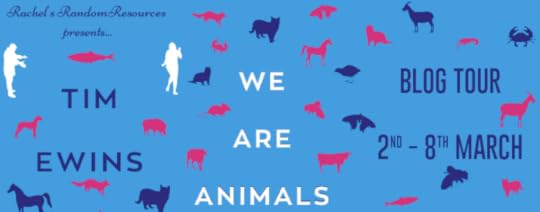
*I received a free ARC of this book with thanks to the author and Rachel Gilbey at Rachel’s Random Resources blog tours. The decision to review and my opinions are my own.*
Blurb: A cow looks out to sea, dreaming of a life that involves grass.
Jan is also looking out to sea. He’s in Goa, dreaming of the passport-thief who stole his heart (and his passport) forty-six years ago. Back then, fate kept bringing them together, but lately it seems to have given up.
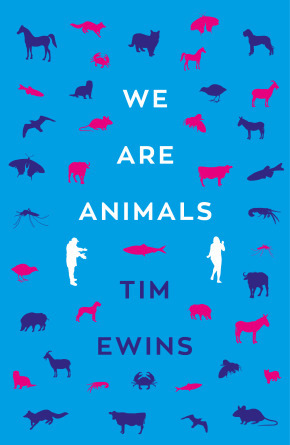 Jan has not. In his long search he has accidentally held a whole town at imaginary gunpoint in Soviet Russia, stalked the proprietors of an international illegal lamp-trafficking scam and done his very best to avoid any kind of work involving the packing of fish. Now he thinks if he just waits, if he just does nothing at all, maybe fate will find it easier…
Jan has not. In his long search he has accidentally held a whole town at imaginary gunpoint in Soviet Russia, stalked the proprietors of an international illegal lamp-trafficking scam and done his very best to avoid any kind of work involving the packing of fish. Now he thinks if he just waits, if he just does nothing at all, maybe fate will find it easier…
View original post 705 more words
February 27, 2020
Trip Fiction Guest Blog
Thank you to Trip Fiction for featuring We Are Animals on their website (under Goa) and for posting this guest blog post (which you can also read on their website here)
Talking Location with author Tim Ewins – Goa
26th February 2020
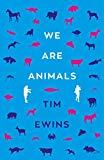 #TalkingLocationWith… Tim Ewins, author of We Are Animals, a novel that opens and closes in GOA.
#TalkingLocationWith… Tim Ewins, author of We Are Animals, a novel that opens and closes in GOA.
I wasn’t a writer when I first visited Goa.
Gemma (my partner) and I had decided to take a nice, relaxing month-long jaunt around India, starting in Varanasi (an interesting, but manic sensory overload), through to Khajuraho (to gawp at some ancient pornography carvings… hey, we like what we like) and then on to the big cities; Agra, Delhi, Amritsar, Chandigarh, across Rajasthan, down to Mumbai, further down to Goa and then finally on to Kerala.
The jaunt wasn’t as relaxing as we’d hoped… we spent five nights in a row sleeping on trains and in train stations just to keep to our own schedule. On the sixth night we booked a room just for the shower.
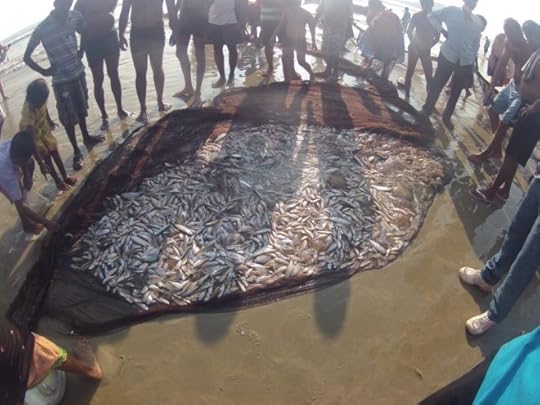
Sat in Mumbai airport, an hour before our flight, we looked through our ‘India checklist’. We had 10 days left and just two more destinations before we had to fly home: Goa and Kerala.
Our first experience of Goa was the taxi ride from the airport to our first stop, Palolem beach. The driver chatted with us like he didn’t have a care in the world (he drove like that too actually). We drove past palm trees and dusty fruit stalls, and when we finally arrived at our little beach hut, we were greeted with a warm welcome and a cup of steaming chai.
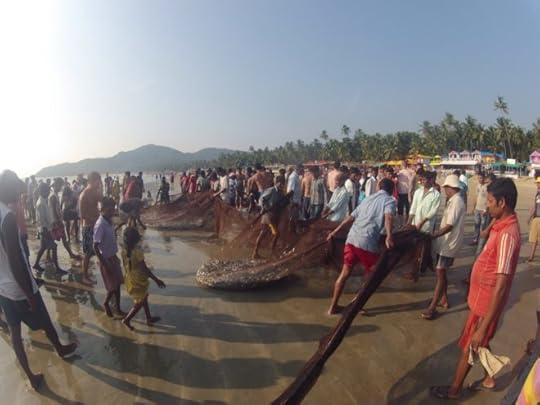
In the morning we found a health food café which served large portions of cereal and fruit and then we relaxed on the beach…all day. At one point we got up to watch the fishermen bring in the days catch, but that was about it. That night, Gemma looked confused.
‘I feel,’ she started, as the seawater gently lapped under our table. I looked at her, waiting.
‘Relaxed?’ I suggested after while, and she nodded; confused, unsettled. This was an India we hadn’t yet seen.
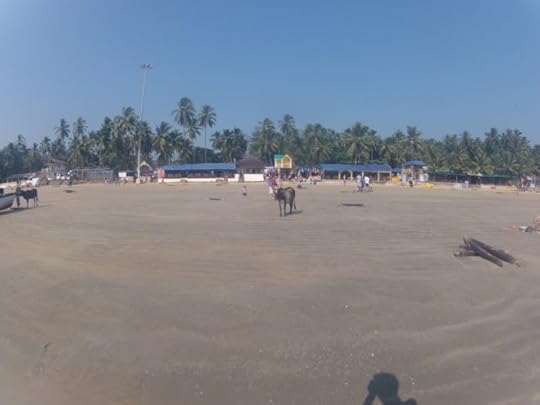
The second day on Palolem beach was similar; we swam, we ate, we watched the fish come in and we talked with the fishermen. Tomorrow we would move onto a different beach, or maybe we’d take a train up to Panaji, Goa’s capital. Of course, we’d see more of Goa… of course we would.
As the train left for Panaji at twelve forty-five the following afternoon, I found myself on the same beach, watching a thousand bubbler crabs rolling sand into small balls just for the sea to wash the balls away again, their hard work juxtaposed against the calm surrounding them.
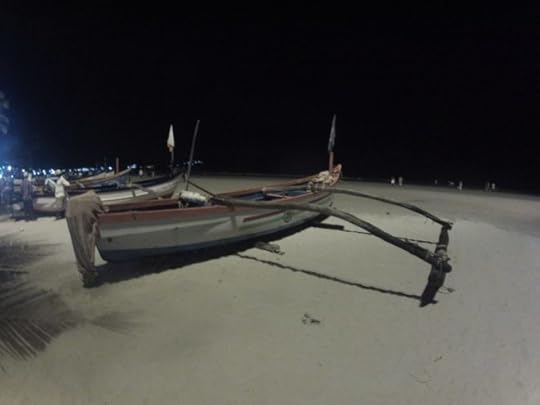
When the bus left for Arossim beach at three, I was leaning against a bar on Palolem chatting with an aging hippy about ‘his Goa’ – the beach that once was. Earlier, I’d seen that same hippy, beard in a grey goatee, body in nothing but a string thong, dancing to no music and chanting out towards the sea. He doesn’t know it, but that man became the inspiration for the protagonist in We Are Animals, Jan.
We didn’t leave Palolem beach that day, and we didn’t leave the next. On the fifth day I started to write. I wrote about our travels and the country we’d seen and learnt a little about, and I wrote something to do with a sand bubbler crab dreaming about travelling to England. I couldn’t tell you why.
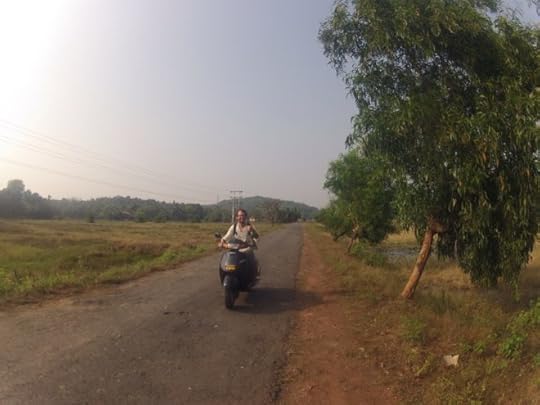
Finally, on the sixth day, the day before we were due to travel down to Kerala, Gemma and I managed to bring ourselves to become active. We hired mopeds and drove through the mountains up to Margao, quickly becoming accustomed to a new, more aggressive, more (ahem) fun way of driving, and then we drove further north to Sahakari Spice Farm. The farm was relaxing… frankly we could have stayed there for a week, but the lady we’d hired the moped wouldn’t have been happy about it, so we didn’t.
Our next week on Palolem was taken up by yoga lessons, cookery classes, exploration of beaches and seeking out the spots where sea turtles occasionally scuttle up the beach to deposit their eggs. Goa, to us, was a small sandy bubble, that we just couldn’t bring ourselves to leave.
Even from England I couldn’t quite bring myself to leave it. Palolem beach is the first and last destination in We Are Animals. One day, I fully intend to grow a grey goatee, wear nothing but a string thong and dance to no music, chanting out towards the sea, and maybe, just maybe, I’ll tell another, younger traveller, about ‘my Goa’ – the beach that once was.
I’ve heard Kerala’s lovely by the way, but I couldn’t honestly tell you, I’ve not yet experienced it…
Thank you so much to Tim for sharing his experience of GOA. And it’s Kerala next time, no doubt!
Zoipappa Bookstagram Reviewer reviews We Are Animals 5 stars
Thank you so much to Beatha (@zoipappa_beatha on Instagram) for this amazing review, and beautiful photo!
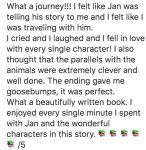
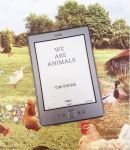
February 26, 2020
Writing Itself Podcast
I recently guested on the lovely Sean McElhiney’s podcast ‘Writing Itself’. Sean was interested in the writing, editing and publishing process, along with my use of a broken iPad. If any of that interests you (everyone knows that broken iPads are more interesting that working ones) then maybe this is the podcast for you. You can listen here.
[image error]
February 24, 2020
Writing Through the Roof podcast!
The lovely Madeleine D’Este was kind enough to have me on her podcast as a guest, and it was delightful! You can listen using the following links…
Stitcher
iTunes
iHeart Radio
‘I started writing We Are Animals as a jokey book but then I had a son, at which point the novel acquired more depth and heart. On the flip side, the chapters I wrote on two hours’ sleep needed a lot of rewriting…’
[image error]
February 21, 2020
Review from Bristol 24/7
Joe Melia from Bristol 24/7 has provided this lovely quote and review for We Are Animals. Thanks Joe!
[image error]
The Bookseller
Today The Bookseller tweeted my name and I hit my head on the roof of my car with excitement. Here’s the article
Eye Books unveils digital list Lightning Bolts
Published February 20, 2020 by Florence Leslie
Independent publisher Eye Books has unveiled a digital-first fiction list, Lightning Bolts.
The new series, a part of Lightning Books, will be launched as e-books at a 99p introductory discount price with print editions following for titles selling well.
We Are Animals, “a heartwarming tale of lost love set in Goa” by stand up comic and writer Tim Ewins, will launch the series on 6th March.
Publisher Dan Hiscocks said: “We want to continue to bring exciting new voices to the market, but the changing conditions and levels of support by both media and retail mean it is not always possible to publish their work traditionally. Under this new imprint, we will launch some authors in digital form first, where the barriers to market are lower, to allow them to get a following. Once they do so, we hope that will persuade retailers to support the same novels in traditional print format. The initiative also allows us to be more agile and launch books much more quickly, which appeals to many of our authors.”
Following at two-week intervals throughout the spring are All the Beautiful Liars, a semi-autobiographical journey by Australian writer Sylvia Petter, iRemember, “a sci-fi noir with a psychedelic twist” by writer and filmmaker S V Bekvalac, “dark domestic drama” Landsliding by Mandy Jameson, originally self-published and now repackaged and edited by Lightning, and Marrow Jam, “a cosy crime caper” by Susan A King, shortlisted for the Write Here, Right Now novel competition at the Bradford Literature Festival.
An Interview with Bristol 24/7
Thank you to Joe Melia at Bristol 24/7 for this interview, which I loved being a part of. You can read it here and I’ve also pasted it below…
[image error]
BOOKS / FICTION
‘THIS NOVEL IS MORE ME THAN ANY OF MY STAND-UP SHOWS HAVE EVER BEEN’
By JOE MELIA, Tuesday Feb 18, 2020
Tim Ewins has been performing stand-up comedy for several years. More recently, though, he has been concentrating on writing fiction and his debut novel, We Are Animals, will be published on March 2. It is a witty, engaging, offbeat tale of a decades-spanning love, set in various locations across the world and co-starring several animals.
Ewins, who lives in St George, tells Bristol 24/7 more about the contrast between writing stand-up and fiction, fate, and the influence of children’s books on his work.
You said in another interview about stand-up comedy: “When I perform, I’m performing a character, it’s not really me.” Is it really you who has written the novel?
It’s funny, that’s the exact question my mum asked when I said I’d written a novel: “was it really you?” Strangely, I would say that this novel is more me than any of my stand-up shows have ever been. I wrote We Are Animals over four years which were, in my personal life, a fairly eventful four years, so whilst most of the plot is whimsical and hopefully (!) humorous, there’s a lot in there that is personal to me. It’s set across ten countries, all of which I’ve visited at some point, and the characters are all based loosely on people I’ve met.
Having said that, there is literally a chapter in We Are Animals which tells the life story of a cow in Goa, and whilst I enjoyed writing it, I wouldn’t say that bit was all that personal to me.
How different is writing fiction to writing stand-up, and did you find writing the novel to be a kind of performance?
There are two ways to answer this; my stand-up sets were largely punning and one-liners (with a few rap songs and a strip-tease chucked in, naturally). When I was writing comedy, often the connection with the audience came from the performance itself. You don’t get to do the performance bit with a book, it’s normally delivered to the reader whilst they’re alone. It’s much more intimate in that way.
The other way to answer is in a literal sense; writing stand-up and fiction are very similar. On an iPad, on a bus, on the way to work.
What inspired the main premise of the book?
I like reading books which are set in interesting countries, and I like stories about real love that lasts a lifetime, despite the odds. The concept of having different animals pop up throughout the book to symbolise certain parts of the plot was inspired by the many children’s books that I used to love myself, and now love reading to my son. I’m a huge fan of Roald Dahl, and I wanted to write about animals as characters in the same way that he does in some of his younger books, but I wanted to do that for adults.
The word ‘fate’ appears 27 times in the novel. Do you believe in fate, in “letting the universe take over” as Manjan puts it?
Thank you for counting! Manjan, the main character in We Are Animals is a strong believer in fate, because he has to be. Honestly, I’d like to think that if something doesn’t happen, then something else will, and that fate can lead in many different directions.
I’m not the kind of person to believe in fate, but the fact remains that I met my wife, who is from the opposite end of the country, in the union bar on my first day of university and fell instantly in love with her (she claims the same thing, although I think that way round is harder to believe.) We were friends for about five years before we admitted that to each other, so that feels pretty fate-y. Although, I suppose, another way to look at that story, is that both me and my wife have the capacity to keep secrets from each other for long periods of time…
Is the town of Fishton where Manjan grew up based on anywhere in particular and did you grow up in a similar type of place?
Lots of the locations in We Are Animals are real, but all the English towns are fictitious to allow me the creative licence to make things up about them! Fishton is basically Whitby with pieces of my hometown, Clevedon, thrown in. As far as I know, neither Whitby nor Clevedon have an international illegal lamp trafficking scam going on in them, although if they did, I assume I wouldn’t know about it, so maybe…
There is another English town in We Are Animals called Victoridon, where Manjan and Ladyjan go to hide out in the seventies. Victoridon is Clevedon in every way, down to the specific charity shop where Ladyjan and Manjan buy their disguises.
Are you a Vest (energetic, optimistic) or a Moustache (seasoned, knowing)?
I’d like to think I’m a bit of both, but not necessarily the best or worst bits of either. A person who is a moustache would think that a person who is a vest is annoyingly positive, like a puppy repeatedly jumping into your knee and then falling backwards, over and over again. The vest would think that the moustache is just stuck in their ways and grumpy. But blind optimism can be a beautiful thing, as is knowing who you are and knowing what makes you happy. I think we’re all probably a little bit vest and a little bit moustache.
Tim Ewins’ debut novel, We Are Animals, will be published on March 2 in ebook at an introductory price of £1. The paperback edition will be published in the summer. For more information, visit: https://www.amazon.co.uk/We-Are-Animals-Tim-Ewins-ebook/dp/B084HK3C8Q/ref=sr_1_1?keywords=tim+ewins+animals&qid=1581349978&sr=8-1
February 13, 2020
North Somerset Times
Thank you to the North Somerset Times for this lovely article!
[image error]


